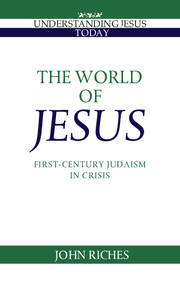Book contents
- Frontmatter
- Contents
- Introduction
- 1 The Political, Economic, Social, and Cultural Context of First-Century Palestinian Judaism
- 2 Unity and Diversity in Judaism from the Third Century B.C.
- 3 Membership of the People of God
- 4 Setting Priorities and Maintaining Group Standards
- 5 Hopes for the Future
- 6 Jesus and His Kingdom
- Conclusion
- Suggested Reading and Questions for Discussion
- Significant Dates, Events, and Writings
- Deuterocanonical and Nonbiblical Works Cited
- Index
- Frontmatter
- Contents
- Introduction
- 1 The Political, Economic, Social, and Cultural Context of First-Century Palestinian Judaism
- 2 Unity and Diversity in Judaism from the Third Century B.C.
- 3 Membership of the People of God
- 4 Setting Priorities and Maintaining Group Standards
- 5 Hopes for the Future
- 6 Jesus and His Kingdom
- Conclusion
- Suggested Reading and Questions for Discussion
- Significant Dates, Events, and Writings
- Deuterocanonical and Nonbiblical Works Cited
- Index
Summary
Great religious prophets and innovators transcend their time. They reach out beyond it, perceiving new worlds and new times beyond the imaginings of their contemporaries. They evoke in some of their contemporaries a response that sets them on the difficult and problematic task of transposing such dreams into reality. The Protestant Reformation gives birth to modern Europe; early Christianity dons the imperial robe.
Such religious figures, however, remain in one sense on their own. Standing at the margins of their society, isolated from the rest of their contemporaries, they dream dreams that bring down the wrath of the powers that be and cause their friends to wonder if they have taken leave of their senses. Luther stands alone at Worms to face the might of the Holy Roman Empire of the German Nation. Jesus dies on the cross abandoned by even his closest followers.
And so it is tempting for the prophets' later followers to wrest them out of their time altogether, to see them and their words as belonging no longer to their original setting but as eternally destined for all peoples and societies. We study the texts that report their words and deeds as if they spoke equally clearly to all people at all times. The text becomes the thing. But in setting the text free from its time, the prophets' followers run the risk of divorcing the texts, not only from their contemporary setting but from the prophets themselves.
- Type
- Chapter
- Information
- The World of JesusFirst-Century Judaism in Crisis, pp. 1 - 9Publisher: Cambridge University PressPrint publication year: 1990

